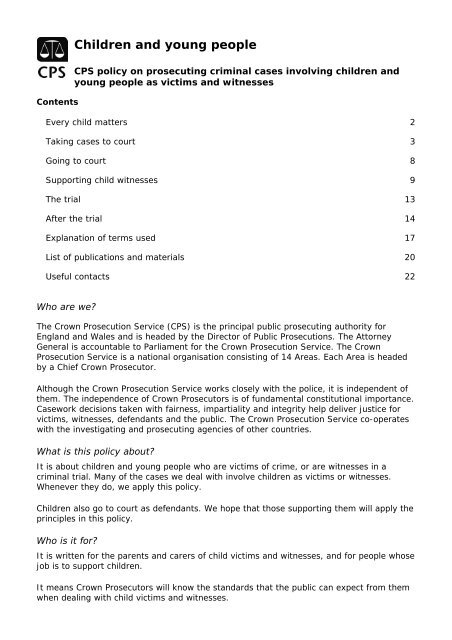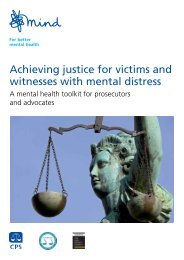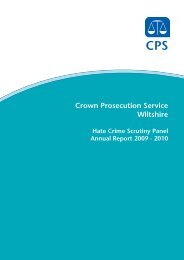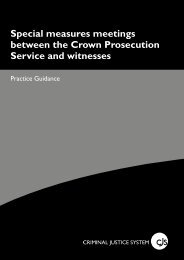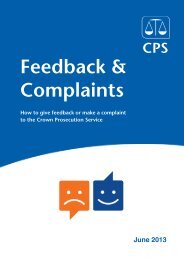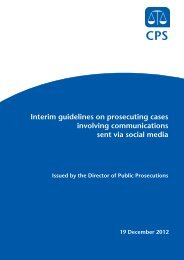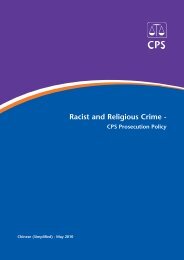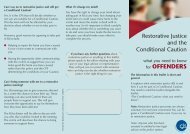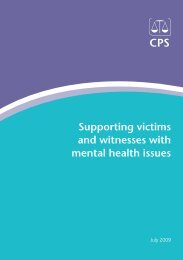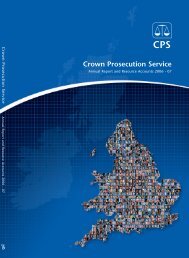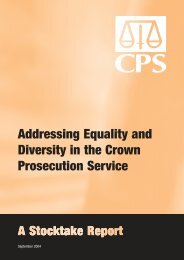CPS Policy on Prosecuting Criminal Cases Involving Children and ...
CPS Policy on Prosecuting Criminal Cases Involving Children and ...
CPS Policy on Prosecuting Criminal Cases Involving Children and ...
You also want an ePaper? Increase the reach of your titles
YUMPU automatically turns print PDFs into web optimized ePapers that Google loves.
If the police tell us there are children involved it could affect our view of the seriousness ofan offence. It is also informati<strong>on</strong> we can give to magistrates <strong>and</strong> judges so that they willknow the impact that a crime has had <strong>on</strong> a child. That may be relevant when a defendantis sentenced.<strong>Children</strong> are individuals<strong>Children</strong> have particular needs <strong>and</strong> wishes, not just because they are children, but becausethey are individuals. We will try hard to be sensitive to the fact that all children have needs<strong>and</strong> wishes, but that children are not all the same.<strong>Children</strong> all have different experiences <strong>and</strong> come from different backgrounds <strong>and</strong> cultures.We will try hard to underst<strong>and</strong> the different ways we may need to treat them to respectthose differences.We will try to speak <strong>and</strong> write to children in their first language using an interpreter if weneed to.Some children, or their parents, may have very str<strong>on</strong>g views <strong>on</strong> whether people who speakto children are male or female or from a particular ethnic background. There may becustoms or beliefs which may make it difficult to talk to children <strong>on</strong> certain days such asholy days. Whenever we can we will respect these views. We will be careful about how weask children to talk about things that may be difficult or embarrassing.We will be sensitive to the fact that children have different levels of ability whatever theirage. We will try to find the best way to make sure that each child is treated in a way thatrespects his or her own needs.We will not assume that all children can hear or see well or move about easily. We willmake sure we find out about any extra help that children may need so they can give theirbest evidence.<strong>Children</strong>'s best interestsWe will always think about what is best for children in criminal cases. It will be high <strong>on</strong> ourlist of what is important but it cannot be the <strong>on</strong>ly thing we c<strong>on</strong>sider. We look at this later inmore detail in the secti<strong>on</strong> <strong>on</strong> ‘The Public Interest'.<strong>Children</strong> - our st<strong>and</strong>ardsThe Prosecutors' Pledge (a ten-point pledge that describes the level of service victims canexpect to receive form prosecutors) <strong>and</strong> the Victims' Code set st<strong>and</strong>ards for how we willtreat victims <strong>and</strong> witnesses in our work.The United Nati<strong>on</strong>s C<strong>on</strong>venti<strong>on</strong> <strong>on</strong> the Rights of the Child (adopted by the UK Governmentin 1991) says that adults must do what is best for children <strong>and</strong> think about how theirdecisi<strong>on</strong>s will affect them. <strong>Children</strong> have the right to fair treatment in a justice system thatrespects their rights.This policy takes those st<strong>and</strong>ards <strong>and</strong> looks at how we apply them in cases where childrenare victims or witnesses.Taking cases to courtWe can help to keep children safe by working with the police to take str<strong>on</strong>g cases to court.
If defendants are found guilty, courts have the power not <strong>on</strong>ly to punish them, but also tomake orders intended to c<strong>on</strong>trol their behaviour in future.The Code for Crown ProsecutorsWe decide which cases to prosecute by applying two tests that are set out in the Code forCrown Prosecutors; The Code is issued by the Director of Public Prosecuti<strong>on</strong>s, it sets outthe principles to be applied when deciding whether or not an individual should beprosecuted. Both tests must be passed before a case can be prosecuted.Firstly there must be sufficient evidence to provide a realistic prospect of c<strong>on</strong>victi<strong>on</strong> beforethe case can go to court.Before we decide to charge a suspect with an offence, there must be enough evidence sothat magistrates or a jury will be more likely than not to c<strong>on</strong>vict the defendant of what heor she is accused of.Sec<strong>on</strong>dly it must be in the public interest to prosecute. We have to balance the factors for<strong>and</strong> against prosecuti<strong>on</strong> carefully <strong>and</strong> fairly.EvidenceWe will work with the police to build str<strong>on</strong>g cases by collecting good evidence, but we willstop cases where the evidence is not str<strong>on</strong>g enough for the court to find the defendantguilty. We cannot prosecute if there is not enough evidence that can be used in a trial;there are technical legal rules about whether courts will allow evidence to be used. Forexample, evidence that has been obtained unlawfully may be ruled 'inadmissable' by thecourt <strong>and</strong> so cannot be heard.Video statementsPolice officers or social workers who have been trained to work with children can use aspecially equipped room to record <strong>on</strong> video what children under the age of 17 tell them.They usually do this in sexual cases or where there was violence or neglect or a child hasbeen abducted. In other cases it depends <strong>on</strong> a number of factors, including how serious theoffence was <strong>and</strong> how it has affected the child, as well as whether it is likely to improve thequality of the evidence the child can give; Achieving Best Evidence Vol. 1 paragraphs2.26-2.28.They will always try to talk to children in the language of their choice using an interpreter ifnecessary.Parents or carers will not usually be in the room with their children, but they will benearby, unless they themselves are suspects, in case the child becomes upset. The videowill be played in court if there is a trial <strong>and</strong> every<strong>on</strong>e in court will be able to see it. Thedefendant will also see the video, or the statement, before the case comes to court, as wellas <strong>on</strong> the day of the trial.Making a victim pers<strong>on</strong>al statementVictims can make an additi<strong>on</strong>al statement called a victim pers<strong>on</strong>al statement at any stageof the case, but they do not have to make <strong>on</strong>e if they do not want to. It is in additi<strong>on</strong> tothe video or statement about the offence itself.
In many cases the police officers will take this statement from a child at the start of thecase, using the video room, rather than writing it down. Parents or carers can make <strong>on</strong>e <strong>on</strong>behalf of a child victim.If a child or parent or carer has not made a victim pers<strong>on</strong>al statement <strong>and</strong> wants to, orwants to add anything to <strong>on</strong>e they have already made, they should c<strong>on</strong>tact the policeofficer.Using a victim pers<strong>on</strong>al statementIn the statement victims can describe how they have been affected by the crime. They cantalk about their wishes or needs during the case <strong>and</strong> any c<strong>on</strong>cerns they may have as aresult of the offence. The defendant will be able to see the video or the statement with allthe other evidence.Prosecutors can use victim pers<strong>on</strong>al statements to help them make decisi<strong>on</strong>s about cases,for example when deciding whether they should ask the court to impose c<strong>on</strong>diti<strong>on</strong>s when adefendant is <strong>on</strong> bail.Courts can use them to help decide what sentence defendants should receive when theyhave been c<strong>on</strong>victed.C<strong>on</strong>sidering the evidenceA Crown Prosecutor will look at the evidence, including children's videos or statements, todecide whether the suspect should be charged or whether further evidence is needed.We can ask the police to do further investigati<strong>on</strong>s if there is not enough evidence. If theevidence is still not str<strong>on</strong>g enough or cannot be used in a trial we will stop the case.After a suspect has been charged with an offence, we keep the decisi<strong>on</strong> under review,especially if more evidence or other informati<strong>on</strong> comes to light.The Public InterestIf the evidence is str<strong>on</strong>g enough, we go <strong>on</strong> to decide if it is in the public interest toprosecute.ExamplesThese are examples from the Code for Crown Prosecutors of what we will c<strong>on</strong>sider:how serious the crime isif the victim was a childif an offence was committed in the presence of a childhow serious the punishment could bethe ages of the people involvedif it was plannedif it is likely to happen againhow a court case could affect the victim.This list does not cover everything. Each case is different <strong>and</strong> has to be decided <strong>on</strong> its ownmerits. The more serious the offence the more likely it is that a prosecuti<strong>on</strong> will be neededin the public interest.
How we decideWe think carefully about the effect <strong>on</strong> children <strong>and</strong> their families when we make thesedecisi<strong>on</strong>s. The younger a child is the more careful we will be; Prosecutors' Pledge: 'Takeinto account the impact <strong>on</strong> the victim or their family when making a charging decisi<strong>on</strong>'.There may be several children involved. What is best for <strong>on</strong>e of them may not be best forall of them.There will often be adults involved as well <strong>and</strong> we have to think how our decisi<strong>on</strong>s willaffect them.If a crime against a child is serious, <strong>and</strong> the evidence is str<strong>on</strong>g enough, we will nearlyalways prosecute. We will always think about the effect <strong>on</strong> that child of going to court, <strong>and</strong>make sure there is good support before, during <strong>and</strong> after the trial.Listening to childrenWe will always listen carefully to what children have to say about their case <strong>and</strong> aboutgoing to court.<strong>Children</strong> can give us their views by telling the police officer, witness supporter or witnesscare officer, who will pass them <strong>on</strong> to us.In a small number of cases we may have a meeting with a child <strong>and</strong> his or her parents orcarers to discuss their views or explain why we have made certain decisi<strong>on</strong>s.<strong>Children</strong>'s views are important, but in the end we have to make the final decisi<strong>on</strong> in cases.We will listen carefully, but we cannot promise to do what children want all the time.Some comm<strong>on</strong> c<strong>on</strong>cernsVery young childrenThe younger children are, the more careful we have to be about deciding whether it is rightto ask them to become involved in a criminal trial.There are no fixed rules about how old children must be before they can give evidence orbefore we will prosecute a case, but there are practical as well as welfare c<strong>on</strong>cerns.All witnesses have to be able to underst<strong>and</strong> questi<strong>on</strong>s <strong>and</strong> be able to give replies that canbe understood; Secti<strong>on</strong> 53 Youth Justice <strong>and</strong> <strong>Criminal</strong> Evidence Act 1999 sets the test forwhether a witness is competent to give evidence. In some areas of the country an'intermediary', who is specially trained to help children communicate, can help them tounderst<strong>and</strong> <strong>and</strong> answer questi<strong>on</strong>s, if they would find this difficult without help.We will always look at the help we can give children when we decide whether we canprosecute cases.Parents' c<strong>on</strong>cernsParents or carers may be c<strong>on</strong>cerned about how their children will cope at court. We canhelp by giving them informati<strong>on</strong> about the help available for children. There is more detailin the secti<strong>on</strong> <strong>on</strong> supporting child witnesses (below).
Parents' c<strong>on</strong>sentSome parents or carers may not want their children to give evidence.We do not want children to go to court unless it is necessary, but we have to look carefullyat why parents or carers do not want children to be witnesses.A parent or carer who is accused of a crime, or is influenced by a relati<strong>on</strong>ship with adefendant, for example, must not be able to prevent a child giving evidence. We also needto make sure that parents or carers are fully aware of all the circumstances.We have to think about the interests of others, as well as the child, <strong>and</strong> carefully balancethem all when making these decisi<strong>on</strong>s.We will always try to get agreement by explaining <strong>and</strong> persuading, but there may be somevery serious cases when we have to ask a child to give evidence even if a parent or carerdoes not agree.Charging the suspectIf there is enough evidence <strong>and</strong> it is in the public interest for a case to go to court, we willdecide what charges the suspect will face. There may be more than <strong>on</strong>e charge.We will make sure that the charges reflect the seriousness <strong>and</strong> extent of the offending,give the court sufficient power to sentence a defendant who is found guilty, <strong>and</strong> enable thecase to be presented in a clear <strong>and</strong> simple way.ChangesChanging or dropping chargesWe have to make decisi<strong>on</strong>s all the way through cases. If we make significant changes ordrop a charge we will tell child victims what we have d<strong>on</strong>e <strong>and</strong> why; Prosectutors' Pledge:Inform the victim where the charge is withdrawn, disc<strong>on</strong>tinued or substantially altered.Since 2001 the <str<strong>on</strong>g>CPS</str<strong>on</strong>g> has followed a policy of informing identified victims about significantchanges in a case: The initiative is called Direct Communicati<strong>on</strong> with Victims (DCV).Who do we tell about changes?We will usually write to a child's parents or carers, but this cannot be a fixed rule.There may be reas<strong>on</strong>s why the parents or carers should not know. One or both of themcould be a defendant, for example.If victims are 12 or over, we may write to both them <strong>and</strong> their parents or carers. We d<strong>on</strong>ot think it is normally appropriate to write to children under 12.We may write to older children <strong>and</strong> suggest that they show it to their parents or carers.Explaining our decisi<strong>on</strong>s in a meetingIn some of the more serious cases we will offer to meet child victims to explain ourdecisi<strong>on</strong>s to change or drop charges.This does not mean that we will change the decisi<strong>on</strong>, but we will explain the reas<strong>on</strong>s whywe made it.
<strong>Children</strong> can bring a parent, carer or witness supporter to <strong>on</strong>e of these meetings.Going to courtAvoiding delayL<strong>on</strong>g delays waiting for trials can be very bad for children:they have l<strong>on</strong>ger to feel anxious <strong>and</strong> nervous about the trialafter a l<strong>on</strong>g delay, it is more difficult to remember clearly what happenedit takes l<strong>on</strong>ger to put the past behind them.We will try to get the earliest possible date for the trial <strong>and</strong> have the date fixed in advance.If the defendant pleads 'guilty'C<strong>on</strong>sulting childrenSometimes defendants offer to plead guilty to just some of the charges, or <strong>on</strong> their ownversi<strong>on</strong> of events.Whenever possible, we will c<strong>on</strong>sult child victims <strong>and</strong> their parents or carers for their views;Prosecutors' Pledge: Where practical, seek a victim's view or that of the family whenc<strong>on</strong>sidering the acceptability of a plea. See also: Attorney General's guidelines <strong>on</strong>acceptance of pleas. We will also c<strong>on</strong>sider the impact <strong>on</strong> children of giving evidence at atrial.The basis of a guilty plea must not be agreed <strong>on</strong> a misleading or untrue set of facts <strong>and</strong>must take proper account of the victim's interests.The final decisi<strong>on</strong> rests with the Crown Prosecutor (see the Code for Crown Prosecutors).We will <strong>on</strong>ly accept the defendant's plea if we think the court is able to pass a sentencethat matches the seriousness of the offending, particularly where there are aggravatingfeatures. We never accept a plea just because it is c<strong>on</strong>venient.If the defendant pleads 'not guilty'If a defendant does not admit any or all of the charges, the witnesses will have to giveevidence later at a trial.We describe how we help witnesses prepare for trials in the secti<strong>on</strong> <strong>on</strong> supporting childwitnesses.Keeping in touchWhether the defendant pleads guilty or not guilty, there may be several hearings beforethe trial or the sentencing hearing. We will keep child victims <strong>and</strong> witnesses informedabout the progress of the case <strong>and</strong> make sure they know which hearings they need toattend.Witness Care UnitsWitness Care Units, run jointly by the <str<strong>on</strong>g>CPS</str<strong>on</strong>g> <strong>and</strong> the police, manage the care of victims <strong>and</strong>witnesses from the time a defendant is charged right to the final hearing.
They can help with things like:travel expenseschild-care when carers have to leave children at homeinterpretersarranging support for children at court.Witness care officersEach child victim or prosecuti<strong>on</strong> witness will have their own witness care officer, who will:explain the reas<strong>on</strong>s for any delaysorganise help <strong>and</strong> supportexplain what happened at court hearingsgive the dates of future hearingssay when <strong>and</strong> where the child next needs to attend courtexplain the result of a trialexplain the sentence a guilty defendant was givenoffer support after the casesay 'thank you' at the end of the case.In all cases where defendants plead not guilty, the witness care officer will do a full 'needsassessment', to find out if the child victims or witnesses need any particular help or haveany worries. The witness care officer will use this informati<strong>on</strong> to decide how we can bestsupport children during the case to give their best evidence.Witness care officers cannot help children who are defence witnesses, but the defenceteam can get help through Victim Support <strong>and</strong> the Witness Service at court.Supporting child witnessesThe police tell us if there are children involved in a case, <strong>and</strong> if they have any particularneeds. Knowing this at the start of a case helps us to make sure children have the fullsupport they need, such as those outlined in special measures (below).Sharing informati<strong>on</strong>There are times when we need to c<strong>on</strong>sult other people who work with children about thechild victims <strong>and</strong> witnesses in our cases. There may be help <strong>and</strong> support that they can giveduring cases <strong>and</strong> afterwards, that we cannot. We may decide that we cannot prosecute acase but we may still think that a child needs help or protecti<strong>on</strong> that some<strong>on</strong>e else cangive.There are times when we need other people, such as social workers, teachers or healthworkers to c<strong>on</strong>sult us. They may have c<strong>on</strong>cerns or informati<strong>on</strong> about a child victim orwitness.Informati<strong>on</strong> from them could help us make better decisi<strong>on</strong>s in cases involving children.
Pers<strong>on</strong>al informati<strong>on</strong>There may be pers<strong>on</strong>al informati<strong>on</strong> about a victim or witness that is not used as evidencein the case. It may be relevant background, <strong>and</strong> could assist us (or the defence team) inmaking decisi<strong>on</strong>s or preparing for a trial.There are rules that c<strong>on</strong>trol when informati<strong>on</strong> like this is given to the defence team;Disclosure: A protocol for c<strong>on</strong>trol <strong>and</strong> managment of unused material in the Crown Court.We will apply these rules strictly to make sure that such informati<strong>on</strong> is <strong>on</strong>ly h<strong>and</strong>ed overwhen absolutely necessary, or when the court orders us to do so; Attorney General'sGuidelines <strong>on</strong> disclosure.Therapy <strong>and</strong> counsellingPutting children firstThere are times when children need help to get over what has happened if they have beenvictims or witnesses.We will never say that a child cannot have therapy or counselling until the trial is over. Achild's need for therapy or counselling comes first. We have a separate booklet that dealswith therapy for children. (See list of publicati<strong>on</strong>s <strong>and</strong> materials below).Giving adviceWe need to know if a child has had, or needs to have, therapy before the trial. We have toc<strong>on</strong>sider the possible impact <strong>on</strong> the trial. We also have to tell the defence team that awitness has had therapy or counselling if it is relevant to the case.There are c<strong>on</strong>cerns that some therapies may c<strong>on</strong>taminate the evidence a child will give <strong>and</strong>undermine a prosecuti<strong>on</strong> (hypnotherapy, psychodrama, regressi<strong>on</strong> techniques <strong>and</strong>unstructured groups). We can give advice about what types of therapy or counselling willbe likely to harm the trial.We may, in some cases, have to decide not to go ahead with a case if <strong>on</strong>e of thesetherapies is used, but a child's need for therapy or counselling must come first.Making the decisi<strong>on</strong>People with the right skills, such as social workers, doctors <strong>and</strong> therapists are the <strong>on</strong>es tosay what the child needs, after talking to the child <strong>and</strong> his or her parents or carers.We do not make decisi<strong>on</strong>s about whether a child needs therapy or counselling, but we willwork with every<strong>on</strong>e c<strong>on</strong>cerned to make sure the child receives the support that matcheshis or her particular needs.Support schemesThere are schemes for child witnesses in some parts of the country to help children getready for the trial <strong>and</strong> to support them to feel as relaxed as possible when giving evidence.Witness supporters can help children by:explaining what will happen at the trialhelping them be c<strong>on</strong>fident enough to say if they d<strong>on</strong>'t underst<strong>and</strong> the questi<strong>on</strong> or needhelp.
They cannot discuss the details of the case or do anything which helps children practise theevidence they will give to the court.The witness care officer will know if there is a scheme in the area, or may be able toarrange similar help if there isn't a local scheme.Visits to court<strong>Children</strong> can visit the court before the trial. This helps them feel more relaxed when theyhave to give evidence, as they will already know:what the court looks likewhere the defendant will sitwhere they will waitwhere they will give their evidence.They can also:meet the witness supporter who will be with them at the trial discuss any fears or c<strong>on</strong>cerns they have, with the witness supporter or the staff of thecourt.Reminding children of their evidenceIt is often many m<strong>on</strong>ths from the start of the case to the trial. <strong>Children</strong> may be afraid offorgetting what they told the police by the time they come to give evidence at the trial.Child witnesses are allowed to watch their video or read their statement to remind them ofwhat they said at the start of the case; Achieving Best Evidence Vol 2 paragraphs 4.33 -4.38, <strong>and</strong> Prosectors' Pledge: Assist victims at court to refresh their memory from theirwritten or video statement. Watching the video also helps children to get used to seeingthemselves <strong>on</strong> the TV screen.We recommend that children should see the video before the day of the trial, not <strong>on</strong> theday itself. The visit to the court is a good time to do it.The witness care officer will make the arrangements with the police <strong>and</strong> the witnesssupporter.Dealing with changes to the video or statementSometimes the video or the statement has to be edited, if the magistrates or the judgedecide that parts of them cannot be used in the trial. We will let children know if this hashappened.We will arrange for children to see the edited video or statement so that they know whathas been removed <strong>and</strong> w<strong>on</strong>'t be taken by surprise at the trial.Support at courtThe witness supporterA trained child witness supporter, who knows the building <strong>and</strong> court procedures, will bethere to help <strong>on</strong> the day of the trial.
The supporter can be there when the child gives evidence but cannot discuss the evidenceor tell children what to say.We will try to make sure that the supporter is some<strong>on</strong>e the child has already met <strong>and</strong>trusts, but the magistrates or the judge make the final decisi<strong>on</strong> about who it is.We will make sure it is some<strong>on</strong>e approved to work with children.Special measuresThere are special measures to help children under the age of 17 give evidence in the bestway to increase its quality <strong>and</strong> with as little stress as possible. They include:using a video of their evidence to give their account of what happenedanswering questi<strong>on</strong>s from the defence using the live link from another roomin sexual cases, giving evidence in private by clearing the court of people who do notneed to be there (this does not include the defendant). This can also be d<strong>on</strong>e in caseswhere there has been or may be intimidati<strong>on</strong> of a witness by some<strong>on</strong>e other than thedefendantadvocates <strong>and</strong> judges in the Crown Court removing their wigs <strong>and</strong> gownsaids, such as sign <strong>and</strong> symbol boards, for children who have difficulty speakingscreens to prevent a witness who is in court from having to see the defendantan intermediary to help explain the questi<strong>on</strong>s or answers if necessary (see very youngchildren).How do children get special measures?We make an applicati<strong>on</strong> to the court as early in the case as we can, based <strong>on</strong> theinformati<strong>on</strong> we receive from the police. The magistrates or the judge decide what specialmeasures children can use. We will let children know as so<strong>on</strong> as possible.In a few cases children will meet the crown prosecutor <strong>and</strong> the police officer to talk aboutthe special measures that can be used to help them give evidence. In these meetings thecrown prosecutor is not allowed to discuss the evidence but will answer questi<strong>on</strong>s about<strong>and</strong> explain the court process.The meeting can help us decide what sort of special measures may help the child.Sometimes we may need to explain why we think some special measures are, or are not,needed.PublicityCourts can order newspapers, TV <strong>and</strong> radio not to identify children. This includes theirnames <strong>and</strong> addresses, the schools they attend, or any details that could identify anychildren or young people involved in the case.Courts can also order newspapers <strong>and</strong> TV not to show pictures of child victims <strong>and</strong>witnesses.In most sexual cases, courts can make an order saying that the name of the victim mustnever be made public.We will always try to protect children from publicity by asking that the court makes theappropriate orders whenever it has the power to do so; Prosecutors' Pledge: Address the
specific needs of a victim <strong>and</strong>, where justified, seek to protect their identity by making anappropriate applicati<strong>on</strong> to the court.Other help for childrenWe will ask the court to help children in more general ways, by having regular breaks, forexample. Courts will always try to meet the needs of deaf or blind children or those withphysical or learning disabilities.It is important that we know about children's individual needs. <strong>Children</strong> or their supportersshould tell the police or the witness care officer about any particular needs so we can askthe court to make the necessary arrangements.The trialWe underst<strong>and</strong> that child witnesses are likely to be nervous about going to court. It willprobably be the first time they have ever d<strong>on</strong>e anything like this before.There will be a witness supporter to meet child victims <strong>and</strong> witnesses at court <strong>and</strong> to showthem where to wait <strong>and</strong> answer their questi<strong>on</strong>s.Meeting the advocateA representative of the Crown Prosecuti<strong>on</strong> Service will be at court to make sure that childwitnesses speak to the prosecuti<strong>on</strong> advocate before the trial; Prosecutors' Pledge: Promote<strong>and</strong> encourage two-way communicati<strong>on</strong>s between victim <strong>and</strong> prosecutor at court.The advocate will be able to answer questi<strong>on</strong>s about what will happen during the trial, butmust not discuss the evidence.Meeting the magistrates or the judgeWe will try to arrange for children to meet the magistrates or the judge, <strong>on</strong> the day of thetrial; Achieving Best Evidence, Vol 2, paragraph 4.52 sets out appropriate safeguards.Giving evidenceIf there is a video of a child's evidence, the court will usually watch it. If there is no video,child witnesses will tell the court what happened, in their own words, by answeringquesti<strong>on</strong>s from the prosecuti<strong>on</strong> advocate.Using the ‘live link'<strong>Children</strong> under the age of 17 in cases involving sex, violence, neglect or abducti<strong>on</strong> mustgive evidence using the ‘live link' to the courtroom. They can also use the live link in othercases if the court agrees. This means that they sit in a separate room from the courtroomwhen they give their evidence <strong>and</strong> when the defence advocate asks them questi<strong>on</strong>s.They will not be able to see the defendant, but the defendant <strong>and</strong> the judge <strong>and</strong> theadvocates <strong>and</strong> the public in court will be able to see them.<strong>Children</strong> can see this room <strong>on</strong> their visit to the court so they will know how the equipmentworks when they come to the trial.If children give their evidence by live link from another building, we will make sure thatthey speak to the prosecuti<strong>on</strong> advocate <strong>on</strong> the link before the trial starts.
Giving evidence in the courtroomIn some of the less serious cases a child may have to give evidence in the courtroombecause the magistrates or judge may not agree to a child using the live link.Similarly, if there is a good reas<strong>on</strong> why child witnesses do not want to use the live link, wecan ask the magistrates or judge to allow them to give their evidence in the courtroom.We think it is best, however, for children to use the live link so they do not have to be inthe courtroom at all. If they do give evidence in the courtroom we can ask for a screenaround the child so they will not have to see the defendant.Cross-examinati<strong>on</strong>The child will usually be in the live link room, unless the court has decided they should giveevidence from the courtroom.How questi<strong>on</strong>s should be askedAdvocates should:use words that match the age <strong>and</strong> the abilities of child witnessesallow children time to answer questi<strong>on</strong>s.Advocates have to challenge the evidence given by witnesses but they should not use:over-harsh cross-examinati<strong>on</strong> with any child witnesswords <strong>and</strong> phrases that children cannot easily underst<strong>and</strong>.If a prosecuti<strong>on</strong> advocate thinks a defence advocate is being too aggressive, or not giving achild time to answer, they will ask the magistrates or judge to intervene; Prosecutors'Pledge: Protect victims from unwarranted or irrelevant attacks <strong>on</strong> their character <strong>and</strong> mayseek the court's interventi<strong>on</strong> where cross-examinati<strong>on</strong> is c<strong>on</strong>sidered to be inappropriate oroppressive.Prosecuti<strong>on</strong> advocates will ask magistrates <strong>and</strong> judges to make sure that children caneasily underst<strong>and</strong> the questi<strong>on</strong>s they are asked.Further informati<strong>on</strong>There are details under the list of publicati<strong>on</strong>s <strong>and</strong> materials of informati<strong>on</strong> produced forchildren to explain what happens at court.After the trialSometimes it can take several days to make decisi<strong>on</strong>s in complex cases. The witness careofficer will tell victims <strong>and</strong> witnesses what the result was if they were not at court to hear itthemselves.If the defendant is not guiltyMagistrates or juries must be sure of the defendant's guilt if they are to c<strong>on</strong>vict. If they arenot sure then they must find the defendant not guilty (this is sometimes described as 'areas<strong>on</strong>able doubt'). If the magistrates or jury decide the defendant is not guilty, this doesnot always mean they did not believe the witnesses. Juries do not have to give reas<strong>on</strong>s fortheir decisi<strong>on</strong>s, so it is not possible to know how they reached their decisi<strong>on</strong>.
The advocate or the <str<strong>on</strong>g>CPS</str<strong>on</strong>g> representative will talk to the victim after the trial about what theverdict. <strong>Children</strong> in particular may need reassurance that it is not their fault.If the defendant is guiltySometimes there will be a delay before the court decides what sentence the defendant willget. The court may wish to have reports about the defendant.The witness care officer will tell child victims, usually through their parents or carers, whenthe sentencing hearing will be.<strong>Children</strong> under the age of 14 are not allowed into court without the permissi<strong>on</strong> of themagistrates or the judge. Parents or carers can attend court <strong>on</strong> their behalf to hear whatsentence the defendant receives. If they do not go, the witness care officer will let them ortheir carers know what the sentence was <strong>and</strong> explain what it means.Sentencing the defendantWhen the court sentences the defendant, the prosecuti<strong>on</strong> advocate can tell the court aboutthe effect that the crime has had <strong>on</strong> the child, using the victim pers<strong>on</strong>al statement.The prosecuti<strong>on</strong> advocate, where it is appropriate, will ask the court for compensati<strong>on</strong>, ororders that will protect a child in future; Prosecutors' Pledge: On c<strong>on</strong>victi<strong>on</strong> apply forappropriate order for compensati<strong>on</strong>, restituti<strong>on</strong> or future protecti<strong>on</strong> of the victim.The prosecuti<strong>on</strong> advocate will challenge defence mitigati<strong>on</strong> which unfairly attacks a victim'scharacter; Prosecutors' Pledge: On c<strong>on</strong>victi<strong>on</strong>, robustly challenge defence mitigati<strong>on</strong> whichis derogatory to a victim's character.The court can c<strong>on</strong>sider the effect of the crime <strong>on</strong> the victim when deciding <strong>on</strong> the sentence.It is for the magistrates or judge al<strong>on</strong>e to decide what the sentence should be.If there has to be a sec<strong>on</strong>d trialSometimes there has to be a sec<strong>on</strong>d trial <strong>and</strong> the witnesses have to give evidence again. Ifthat does happen the advocate at the first trial will explain why. The witness care officerwill keep in touch <strong>and</strong> let the victim <strong>and</strong> witnesses know when the new trial will be <strong>and</strong>what will happen next.AppealsAppeals against c<strong>on</strong>victi<strong>on</strong>Sometimes the defendant may appeal against being found guilty by asking a more seniorcourt to hear the case again.In cases held in the magistrates' or youth court, there will be a sec<strong>on</strong>d trial at the CrownCourt. (See The trial for details).In Crown Court cases, the Court of Appeal will decide if the decisi<strong>on</strong> was right. It is veryrare for children to have to give evidence again in these cases.Appeals against sentenceSometimes the defendant may appeal against the sentence.
In cases held in the magistrates' or youth court, a Crown Court judge <strong>and</strong> two magistrateswill decide if the sentence was correct.In cases held in the Crown Court, judges in the Court of Appeal will make the decisi<strong>on</strong>.It is very unlikely that children will ever have to give evidence in appeals against sentence.Appeals by the prosecuti<strong>on</strong>There is no general right for the prosecuti<strong>on</strong> to appeal when a defendant has been foundnot guilty.In a very limited number of cases it may be possible for the prosecuti<strong>on</strong> to appeal againsta decisi<strong>on</strong> by magistrates or a judge that brings a case to an end. One procedure is calledJudicial Review; the law, practice <strong>and</strong> procedure are c<strong>on</strong>tained in ss.111-114 Magistrates'Courts Act 1980, Rules 76-81 Magistrates' Courts Rules 1981, ss.28-31 Supreme Court Act1981, Rule 26 Crown Court Rules 1982 <strong>and</strong> Civil Procedure Rule 54. There are provisi<strong>on</strong>s ins.58 <strong>Criminal</strong> Justice Act 2003 that deal with decisi<strong>on</strong>s by judges in the Crown Court. Thiscan <strong>on</strong>ly be d<strong>on</strong>e where the magistrates or judge have made a mistake about the law.Sometimes we may ask the Attorney General to challenge a sentence, if it falls outside therange that could reas<strong>on</strong>ably be c<strong>on</strong>sidered appropriate, after taking into account all therelevant factors. This is <strong>on</strong>ly available for a limited range of offences <strong>and</strong> within a stricttime limit of 28 days after the defendant was sentenced.If we decide not to submit the case for the Attorney General to c<strong>on</strong>sider, we will notifychild victims without delay. They or their parents or carers may themselves wish to drawthe sentence to the attenti<strong>on</strong> of the Attorney General.Letting children knowThe witness care officer will let child victims know, usually through their parents or carers,when the court will deal with the appeal; Prosecutors' Pledge: Keep victims informed of theprogress of any appeal, <strong>and</strong> explain the effect of the judgement. Parents or carers canattend court <strong>on</strong> behalf of child victims to hear the result; children under 14 are not usuallyallowed into court.If they do not attend the witness care officer will tell children what happened, as so<strong>on</strong> asthey can, <strong>and</strong> will explain what it means.Thanking victims <strong>and</strong> witnessesWhatever the result of the trial is, we will always be grateful that witnesses, especiallychild witnesses, have come to court <strong>and</strong> given evidence. We will always find time to thankthem.We cannot promise that being involved in a criminal trial will be easy, but we want childrento feel that they have been able to play their part, <strong>and</strong> that what we have d<strong>on</strong>e hasallowed their voices to be heard.
Explanati<strong>on</strong> of terms usedAdvocate - A lawyer who presents cases in court.Appeal - A request for a higher or more senior court to change a decisi<strong>on</strong> made by alower court.Barrister - A type of lawyer who gives advice <strong>and</strong> presents cases in court.Case - An investigati<strong>on</strong> <strong>and</strong> any legal work that follows a complaint about a criminaloffence.Charge - When a suspect is formally accused of committing a crime.Code for Crown Prosecutors - The Code for Crown Prosecutors is a document that setsout how we make decisi<strong>on</strong>s about cases.Compensati<strong>on</strong> - M<strong>on</strong>ey paid to a victim by a defendant to make up for loss, hardship,inc<strong>on</strong>venience or injury.C<strong>on</strong>victi<strong>on</strong> - A decisi<strong>on</strong> by magistrates or a jury that the defendant is guilty.Counselling - Giving help <strong>and</strong> advice <strong>on</strong> pers<strong>on</strong>al, social or psychological problems.Courtroom - The room where court cases are heard.Cross-examinati<strong>on</strong> - Challenging the evidence given by a witness in court.Crown Court - A court where criminal cases are dealt with by a judge <strong>and</strong> a jury of 12members of the public. The Crown Court also deals with appeals for cases dealt with bythe magistrates' <strong>and</strong> youth courts.Defence - The reas<strong>on</strong> the defendant says he or she is not guilty of the charge.Defence team - The defendant's lawyers.Defendant - A pers<strong>on</strong> charged with a criminal offence.Defence witness - A pers<strong>on</strong> who gives evidence at court to support the defence case.District judge - A lawyer sitting as a judgeEvidence - The informati<strong>on</strong> given to the court to help make the decisi<strong>on</strong> whether adefendant is guilty.Examinati<strong>on</strong> in chief - The part of the trial when children tell the court what happened.In many cases involving child prosecuti<strong>on</strong> witnesses this is d<strong>on</strong>e using a video made atthe start of the case by the police.Guilty - A defendant is guilty of a crime when he or she admits it or when themagistrates or jury decide they have d<strong>on</strong>e it, after hearing evidence at a trial.Intermediary - An intermediary is a pers<strong>on</strong> specially trained to help children underst<strong>and</strong><strong>and</strong> answer questi<strong>on</strong>s.
Judge - The pers<strong>on</strong> in charge of what happens in a court case. The judge makesdecisi<strong>on</strong>s <strong>and</strong> decides the sentence when a defendant is guilty.Jury - Twelve members of the public who listen to the evidence <strong>and</strong> decide whether thedefendant is guilty in Crown Court cases.Lawyer - The general term for solicitors <strong>and</strong> barristers.Live link - A closed circuit televisi<strong>on</strong> or video link that enables witnesses to giveevidence from somewhere away from the court room, but still allows them to be seen<strong>and</strong> heard <strong>and</strong> to see <strong>and</strong> hear what happens in court.Magistrate - An unpaid pers<strong>on</strong> who acts as a judge in magistrates' court <strong>and</strong> youthcourt cases.Magistrates' court - A court where criminal cases are dealt with by magistrates ordistrict judges. They deal with less serious cases <strong>and</strong> send the more serious cases to theCrown Court.Not guilty - A defendant pleads not guilty if he or she denies the charge. A defendant isfound not guilty if the magistrates or judge decides the prosecuti<strong>on</strong> has not proved thecase.Offender - Some<strong>on</strong>e who has been found guilty of a crime.Plea - When a defendant says he or she is guilty or not guilty.Prosecuti<strong>on</strong> - This means the process that follows when a prosecutor decides a caseshould go to court.Prosecuti<strong>on</strong> witness - A witness who is asked to give evidence to support theprosecuti<strong>on</strong> case.Prosecutor - The pers<strong>on</strong> who presents the case against <strong>on</strong>e or more defendants.Public interest - See the secti<strong>on</strong> <strong>on</strong> The Code for Crown Prosecutors.Sentence - Punishment given when a defendant is found guilty of a crime.Solicitor - A type of lawyer who gives advice <strong>and</strong> prepares <strong>and</strong> presents cases in court.Special measures - The help for witnesses that a court can offer so that they can givetheir best evidence in court. They include live video links, video-recorded statements,screens around the witness box <strong>and</strong> assistance with communicati<strong>on</strong>.Statement - A written or video account by a witness of what he or she saw <strong>and</strong> heard.Suspect - A pers<strong>on</strong> the police think may have committed a crime.Therapy - Treatment of mental or psychological problems. (See Counselling)Trial - This is when the magistrates or jury hear what happened <strong>and</strong> then make up theirminds after they hear both sides.
Victim - A pers<strong>on</strong> who has had a crime committed against them.Victim Support - A nati<strong>on</strong>al charity that supports victims of crime <strong>and</strong> runs the courtWitness Service.Video link - Another way of describing the live link.Witness - A pers<strong>on</strong> who gives evidence in court.Witness care officer - A pers<strong>on</strong> who works in a Witness Care Unit <strong>and</strong> providesinformati<strong>on</strong> <strong>and</strong> arranges help for witnesses in criminal cases.Witness Care Unit - Run by the police <strong>and</strong> the <str<strong>on</strong>g>CPS</str<strong>on</strong>g>, it provides help <strong>and</strong> informati<strong>on</strong> forvictims <strong>and</strong> prosecuti<strong>on</strong> witnesses.Witness Service - A nati<strong>on</strong>al service provided by Victim Support, a registered nati<strong>on</strong>alcharity. There are Witness Service staff <strong>and</strong> volunteers in every Crown Court centre <strong>and</strong>magistrates' court in Engl<strong>and</strong> <strong>and</strong> Wales.
List of publicati<strong>on</strong>s <strong>and</strong> materialsAddresses of the organisati<strong>on</strong>s are in the list of c<strong>on</strong>tactsCrown Prosecuti<strong>on</strong> ServiceCode for Crown ProsecutorsThe Code for Crown Prosecutors sets out the principles we must follow when decidingwhether or not some<strong>on</strong>e should be prosecuted.<str<strong>on</strong>g>CPS</str<strong>on</strong>g> <str<strong>on</strong>g>Policy</str<strong>on</strong>g> for <strong>Prosecuting</strong> <strong>Cases</strong> of Domestic ViolenceThis document explains the way we deal with cases involving domestic violence.<str<strong>on</strong>g>CPS</str<strong>on</strong>g> <str<strong>on</strong>g>Policy</str<strong>on</strong>g> for <strong>Prosecuting</strong> <strong>Cases</strong> of RapeThis document explains the way we deal with cases in which to do with rape.Provisi<strong>on</strong> of Therapy for Child Witnesses prior to a <strong>Criminal</strong> Trial: PracticeGuidanceThis was published in 2001 by us, the Home Office <strong>and</strong> the Department of Health <strong>and</strong>gives guidance <strong>on</strong> therapy for children before a trial.The Prosecutors' PledgeTen promises that describe the level of service you can expect to receive from us.Visit our website at www.cps.gov.uk for to view or download our publicati<strong>on</strong>s.
Barnardo'sNo s<strong>on</strong> of mine!This video <strong>and</strong> report is about boys <strong>and</strong> young men abused by being forced to have sexfor m<strong>on</strong>ey. Available from Barnardo's at www.barnardos.org.ukDepartment of HealthSafeguarding <strong>Children</strong> involved in Prostituti<strong>on</strong>: Supplementary Guidance toWorking Together to Safeguard <strong>Children</strong>Guidance for police, health, social services, educati<strong>on</strong> <strong>and</strong> all other agencies <strong>and</strong>professi<strong>on</strong>als that may work with children. Its aim is to encourage the prosecuti<strong>on</strong> ofthose who force children into prostituti<strong>on</strong>. Available from the Department of Health atwww.dh.gov.ukEvery Child MattersEvery Child Matters: Change for <strong>Children</strong>Every Child Matters: Change for <strong>Children</strong> is the name for a big project across Engl<strong>and</strong>which involves every<strong>on</strong>e who works with children. This includes teachers, doctors,nurses, social workers, youth workers <strong>and</strong> many other people. Available atwww.educati<strong>on</strong>.gov.ukHome OfficeAchieving Best Evidence in <strong>Criminal</strong> ProceedingsA h<strong>and</strong>book of good practice <strong>on</strong> how to deal with vulnerable <strong>and</strong> intimidated witnesses,including children. Available <strong>on</strong> the <str<strong>on</strong>g>CPS</str<strong>on</strong>g> website www.cps.gov.ukThe Code of Practice for Victims of CrimeThe Code of Practice for Victims of Crime sets out the services victims can expect toreceive from the criminal justice system. Available from the <str<strong>on</strong>g>CPS</str<strong>on</strong>g> website www.cps.gov.ukWitness CharterThis document sets out the st<strong>and</strong>ards of service for all prosecuti<strong>on</strong> <strong>and</strong> defencewitnesses. It complements the Code of Practice for Victims of Crime. Available from the<str<strong>on</strong>g>CPS</str<strong>on</strong>g> website at www.cps.gov.ukUnited Nati<strong>on</strong>sUnited Nati<strong>on</strong>s C<strong>on</strong>venti<strong>on</strong> <strong>on</strong> the Rights of the ChildUniversally agreed basic st<strong>and</strong>ards that should be respected by governments. TheC<strong>on</strong>venti<strong>on</strong> sets out the basic human rights that children everywhere have. Availablefrom UNICEF at www.unicef.orgVictim SupportAre you OK?This leaflet explains how Victim Support can help children who have experiencedabuse or violence. Available from Victim Support at www.victimsupport.org.uk
Useful c<strong>on</strong>tactsCrown Prosecuti<strong>on</strong> ServiceThe Crown Prosecuti<strong>on</strong> Service (<str<strong>on</strong>g>CPS</str<strong>on</strong>g>) was set up in 1986 to prosecute criminal casesinvestigated by the police in Engl<strong>and</strong> <strong>and</strong> Wales.Rose Court2 Southwark BridgeL<strong>on</strong>d<strong>on</strong> SE1 9HSTel: 020 3357 0899Website: www.cps.gov.ukBarnardo'sBarnardo's helps children, young people <strong>and</strong> their families over the l<strong>on</strong>g term toovercome disadvantages <strong>and</strong> problems such as abuse, homelessness <strong>and</strong> poverty.Barnardo'sTanners LaneBarkingsideIlfordEssex IG6 1QGWebsite: www.barnardos.org.ukChildLineChildLine is the UK's free 24-hour helpline for children <strong>and</strong> young people in danger ordistress, who can call ChildLine in c<strong>on</strong>fidence <strong>on</strong> 0800 1111 for help with any problem.ChildLineFreepostNATN 1111E1 6BRWebsite: www.childline.org.ukHer Majesty's Courts ServiceHer Majesty's Courts Service (HMCS) administers the civil, family <strong>and</strong> criminal courts inEngl<strong>and</strong> <strong>and</strong> Wales. HMCS covers the Crown Court, county <strong>and</strong> magistrates' courts.Her Majesty's Courts ServiceCustomer Service Unit5th floorClive HousePetty FranceL<strong>on</strong>d<strong>on</strong> SW1H 9HDWebsite: www.hmcourts-service.gov.ukNSPCCThe NSPCC exists to end cruelty to children. The NSPCC wants to see a society where allchildren are loved, valued <strong>and</strong> able to fulfil their potential. To do this, the NSPCC has fourobjectives:
to mobilise every<strong>on</strong>e to take acti<strong>on</strong> to end crueltyto give children the help, support <strong>and</strong> envir<strong>on</strong>ment they need to stay safe from crueltyto find ways to working with communities to keep children safe from crueltyto be, <strong>and</strong> be seen as, some<strong>on</strong>e to turn to for children <strong>and</strong> young people.West House42 Curtain RoadL<strong>on</strong>d<strong>on</strong> EC2A 3NHWebsite: www.nspcc.org.ukRizerRizer provides informati<strong>on</strong> <strong>and</strong> advice for young people about the law <strong>and</strong> crime. Thewebsite includes stories, informati<strong>on</strong> <strong>and</strong> a helpline.Website: www.rizer.co.ukStop It Now!Stop it Now! is a public informati<strong>on</strong> <strong>and</strong> awareness raising campaign regarding childsexual abuse.Stop it Now!UK <strong>and</strong> Irel<strong>and</strong>PO Box 9841Birmingham B48 7WBwebsite: stopitnow.org.ukVictim SupportVictim Support offers free <strong>and</strong> c<strong>on</strong>fidential informati<strong>on</strong> <strong>and</strong> support for victims of crime<strong>and</strong> works to increase awareness of the effects of crime.Victim Support Nati<strong>on</strong>al OfficeCranmer House39 Brixt<strong>on</strong> RoadL<strong>on</strong>d<strong>on</strong> SW9 6DZwebsite: www.victimsupport.org.ukVoice UKVoice UK support people with learning difficulties who have experienced crime or abuse<strong>and</strong> support their families, carers <strong>and</strong> professi<strong>on</strong>al workers.Voice UKWyvern HouseRailway TerraceDerby DE1 2RUWebsite: www.voiceuk.org.uk
Witness ServiceVictim Support runs the Witness Service in every criminal court in Engl<strong>and</strong> <strong>and</strong> Wales. Itsstaff <strong>and</strong> volunteers give informati<strong>on</strong> <strong>and</strong> support to witnesses, victims, their families <strong>and</strong>friends when they go to court.Witness ServiceVictim Support Nati<strong>on</strong>al OfficeCranmer House39 Brixt<strong>on</strong> RoadL<strong>on</strong>d<strong>on</strong> SW9 6DZwebsite: www.victimsupport.org.ukYouth ParliamentThe Youth Parliament aims to give the young people of the UK, between the age of 11<strong>and</strong> 18, a voice which will be heard <strong>and</strong> listened to by local <strong>and</strong> nati<strong>on</strong>al government,providers of services for young people <strong>and</strong> other agencies who have an interest in theviews <strong>and</strong> needs of young people.UK Youth Parliament8 Wakley StreetL<strong>on</strong>d<strong>on</strong> EC1V 7QEwebsite: www.ukyouthparliament.org.uk<str<strong>on</strong>g>CPS</str<strong>on</strong>g> <str<strong>on</strong>g>Policy</str<strong>on</strong>g> Directorate June 2006


